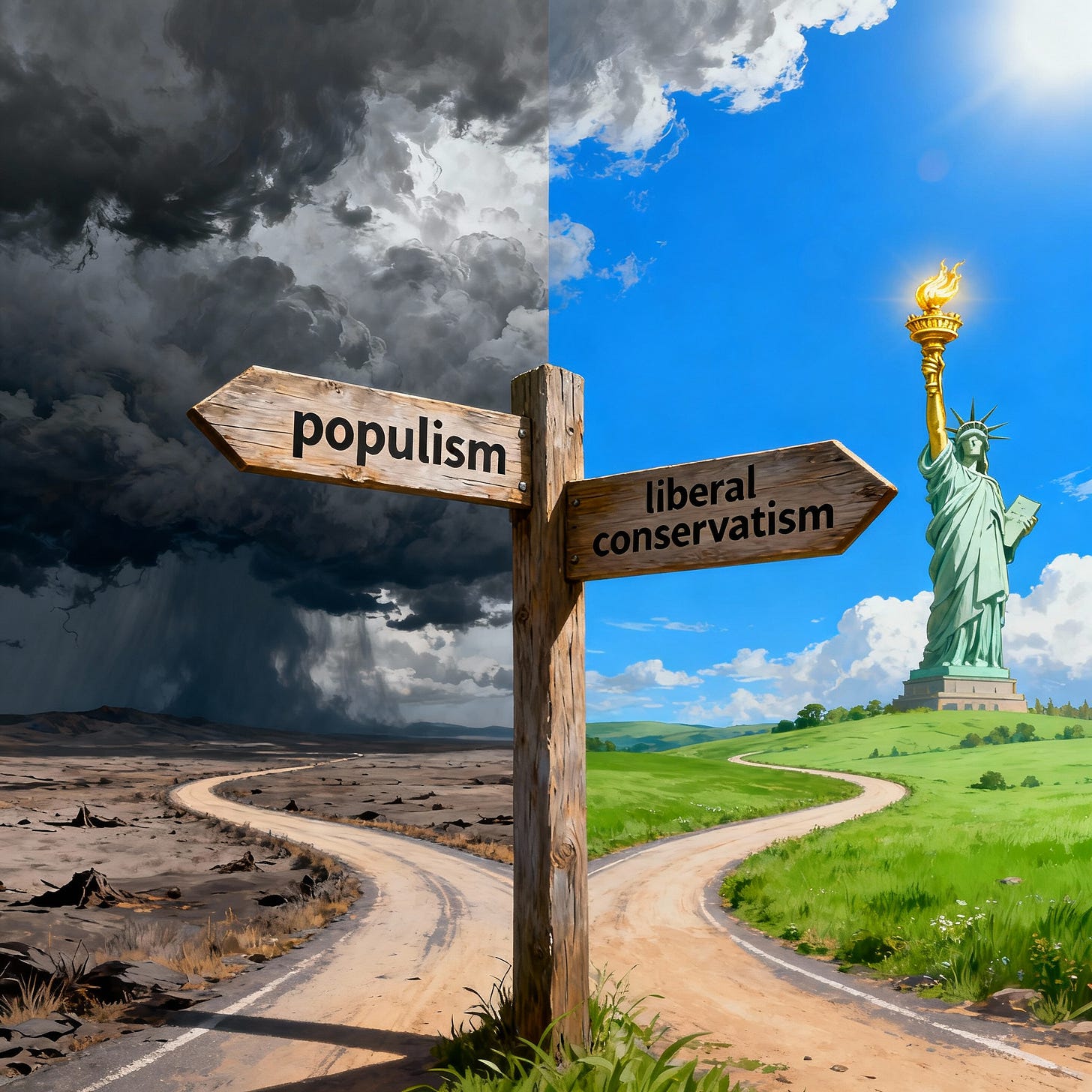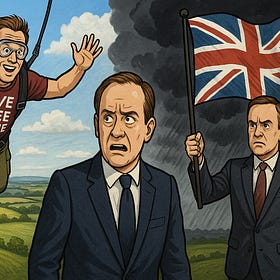The Conservative Party must rediscover liberalism or risk being destroyed
The Conservative Party is not yet dead, but they are in danger of losing what made them worth defending. Renewal will not come from anger, but from principle.
Oliver Dean continues Voices for a Free Future’s series of guest articles showcasing leading and rising talents in Westminster and the free market movement.
For close to two centuries, the Conservative Party has been a broad church - a home to one-nation moderates, free-market Thatcherites, traditionalists, and all those in between. That ideological range was never a weakness but a strength: a living testament to the party’s ability to evolve and reconcile competing traditions under the single banner of stability, freedom, and proper governance.
Throughout that time, the right-of-centre voter always knew where to go. Even if you disagreed with another wing of the party, you could find a group of like-minded people that made it feel like home. It was this refusal to define conservatism too narrowly that helped make the Conservatives the most electorally successful political party in the democratic world. In short, there was an ideological grounding in the party that stood strong even when people found it unpopular. This is in stark contrast to a hyper-fixation on securing headlines and amassing popularity at every opportunity, all whilst simultaneously sidelining ideology.
But in recent years, that broad church has begun to close its doors, albeit to the dismay of those who still believe in core ideological values that bring us closer together. Under successive leaders, the party has grown narrower, angrier, and more tribal. And whilst as a Party member, it is painful to say, under Kemi Badenoch’s leadership, this process has reached an extreme. What we are witnessing is not renewal but reduction. A politics that defines itself not by drawn-out ideas, but by what is popular on any given day. History suggests this never ends well.
To see why this matters, we must recall what conservatism actually is. The party has long contained competing traditions, as was highlighted earlier. Paternalists, libertarians, traditionalists and nationalists all felt as though they had a home within our party. But across such differing ideas runs a crucial notion. The notion of individualism. The belief that the individual, not the state, is the moral centre of political life and that each person knows how best to live their own life rather than being directed by an overbearing government.
This belief binds ‘small c’ conservatism to classical liberalism. Not the modern definition of liberalism that has been hijacked often by bad-faith actors, but the liberalism of Locke, Mill, and to a lesser extent Burke. It is the conviction that liberty must live within the framework of law and order. That freedom and responsibility are two sides of the same coin. One should possess the freedom to do as they please (so long as it does not harm another), but one should also bear the responsibility that such freedom entails. It is the belief that a free society depends not on the instructions of the state, but on the self-discipline of the people and the strength of institutions to come together in peaceful co-existence. A social contract wherein, in return for providing governance and protecting a people’s rights, a population obeys the law and adheres to the customs of a society.
It is easy to cast dispersions that liberalism and conservatism are fundamentally at odds, but to argue this is untrue. The two share a number of key elements, and it is this liberal inheritance that once made the Conservative Party great. It gave British conservatism its distinct, moderate character. It provided it with a blend of liberty and order that helped it resist the ideological extremism that tore other nations apart.
Yet that balance has been lost in recent times. Under Badenoch, the party has drifted away from liberal conservatism toward a harsher, more reactionary politics that lacks any ideological underpinnings. What some critics would label as an imitation of Reform rather than a rejection of it. The fixation on identity and “culture war” issues, though somewhat toned down, has left the party sounding defensive and consumed by grievance.
This is not an ideological conviction, and is especially not what the Conservative Party stands for. It is nothing short of political appeasement. The leadership’s instinct to “out-Reform Reform” betrays a lack of faith in its own ideas and beliefs, and it is costing our party dearly. If this continues, our Party will not only lose an election, but it will lose its ideological soul.
But whilst it is easy to sling mud, it is much harder to offer a route out - a path back to electoral relevance. The answer lies in rediscovering what many have labelled as the “responsible society.” In short, a politics that is grounded in principle, not populism. Whilst there is a far broader focus on shrinking the size of the state, the fundamental message is clear: Thatcher’s conservatism succeeded not because it chased headlines, but because it was anchored in values. The values of personal responsibility, enterprise, duty, and self-government. She understood that policy must flow from principle, and that rhetoric without a moral foundation is just noise. Successive leaders have so desperately attempted to forge themselves in her image. To take a stand against ‘big-stateism’ and to stand up for individualism. But such leaders have been nothing more than tribute bands. Thatcher was not just willing to stand on principle, she was willing to be unpopular - and that is something that today’s generation of Tories needs to reckon with.
Today’s Conservative Party needs the same clarity. To be liberal again is not to be weak or apologetic. Rather, it is to be anchored in something that stresses the importance of people rather than the state. It is to offer a vision of society built on freedom, character, and opportunity.
It means providing a home for those who believe in a smaller state, in enterprise and free speech, but also in tolerance, decency, and the pluralism of modern Britain. It means remembering that the role of government is to empower the individual, not dictate to them and to uphold institutions, not undermine them.
What would be an "authentically Conservative position"?
Steve Baker recently wrote for Voices for a Free Future on his view of what an "authentically Conservative position" would be.
To Badenoch’s credit, there are flashes of promise which indicate that all hope is not lost. Her plan to abolish stamp duty, for example, is an excellent idea. But good economics cannot disguise bad philosophy. Announcements that celebrate enterprise lose their shine when paired with performative outrage and a seemingly insatiable appetite for headlines and media attention.
The Conservative Party is not yet dead, but they are in danger of losing what made it worth defending. Renewal will not come from anger, but from principle. This principle must be a return to liberal conservatism and the responsible society that once made Britain a model of moderation. If Badenoch truly wishes to make the Party a home for liberals again, she must change course. If she doesn’t, she risks those of us who still believe in that tradition abandoning it altogether.
Oliver Dean is a political commentator with Young Voices UK. He studies History and Politics at the London School of Economics and Political Science (LSE) where he is the President of the LSE Hayek Society.




